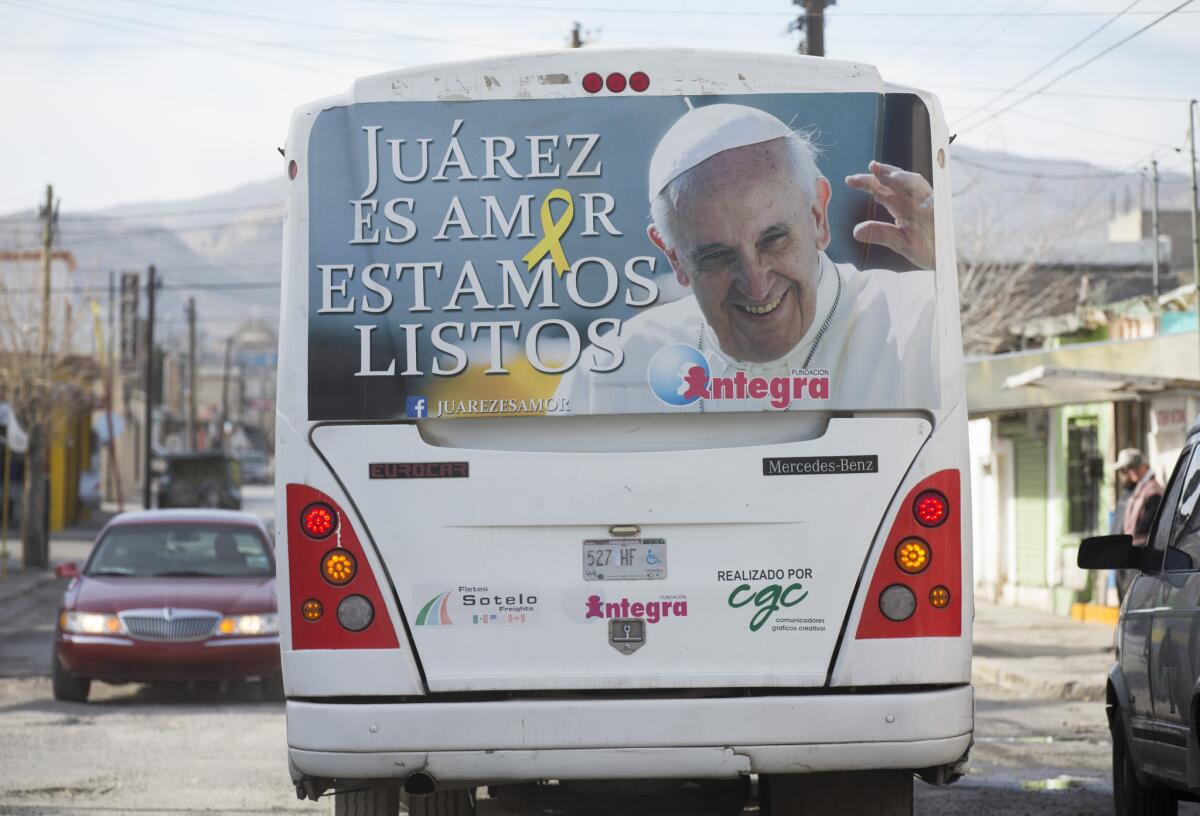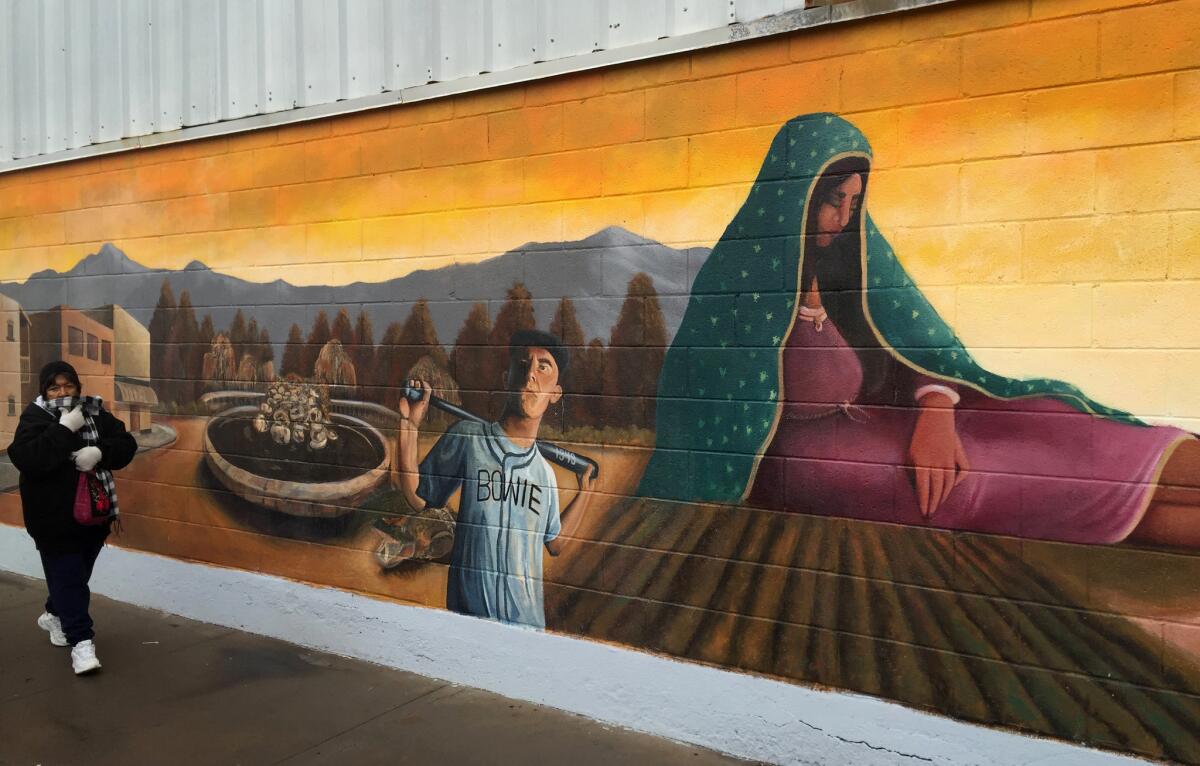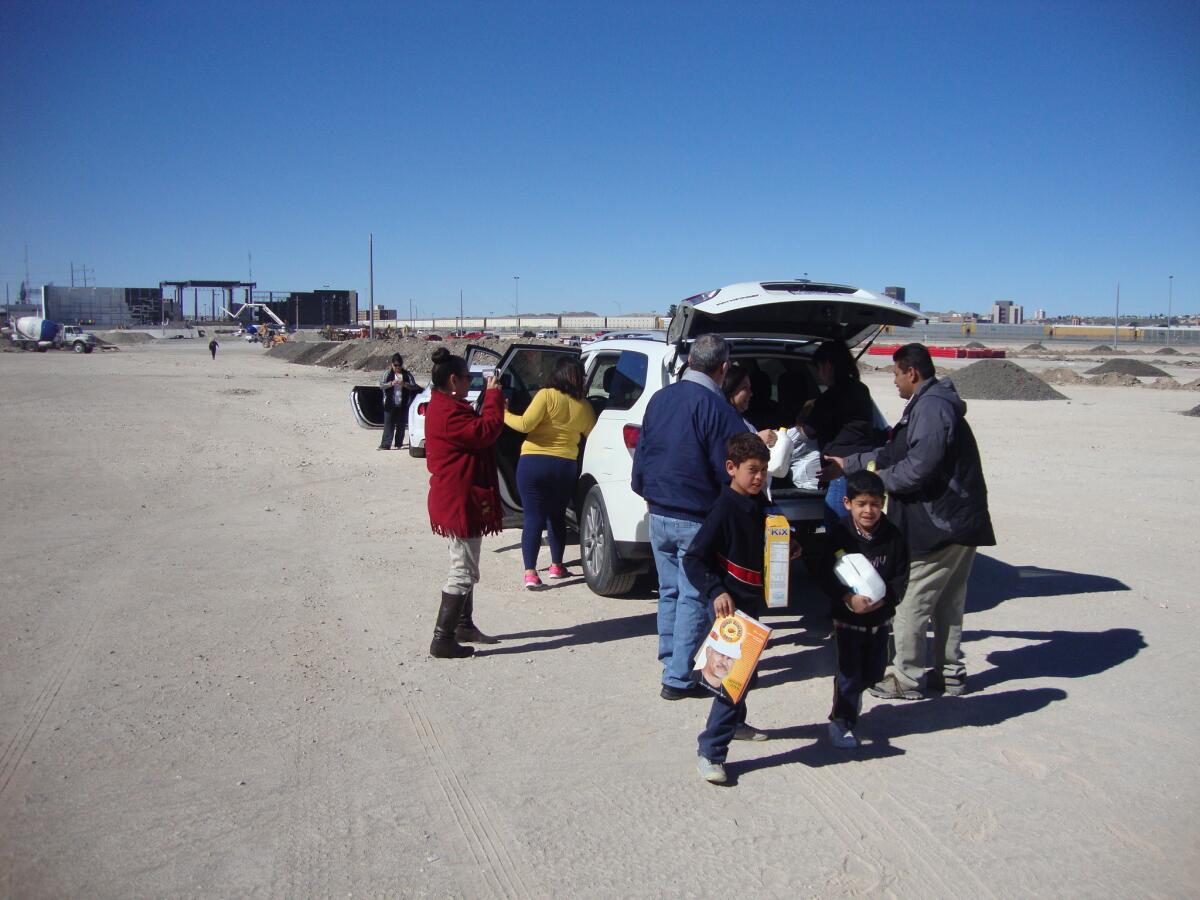With Pope Francis’ border city visit, Texans rediscover Mexico -- and like what they see

The upcoming visit of Pope Francis to Ciudad Juarez is prompting some El Paso residents to visit the border city they shunned for years because of drug cartel violence. A bus ad on a Juarez bus proclaims: “Juarez is love. We are ready.”
- Share via
Reporting from Ciudad Juarez — As she stopped her SUV to be inspected by a customs agent, Andrea Aguirre offered an explanation that’s heard a lot these days as people cross from El Paso south to its sister city.
“We’re going for the pope,” Aguirre said.
Aguirre, 34, a bright-eyed mother of two with glittering dangly earrings, was driving a group of Catholic volunteers to Ciudad Juarez. Even before they crossed the international bridge, they began looking for familiar sights. Some had not been to Juarez for years.
These are the places I remember. All these little restaurants, these candy stores.
— Martin Hinojosa of El Paso, on returning to Ciudad Juarez for the first time since childhood
Many El Pasoans who once regularly crossed the border stopped as the drug wars raged after 2007 and families were gunned down, decapitated bodies dumped in the streets or hung from bridges with narcomantas, or warning banners, from drug cartels.
But life has improved somewhat in Juarez in recent years. Now, with Pope Francis coming to town, it was time to return.
When Francis visits this troubled border city on Wednesday, Aguirre’s group will be among 70,000 volunteers forming a human chain to protect him along his 25-mile route from the airport to the site of an outdoor Mass near the border.
On this day Aguirre and the others were coming to be trained on what to do and where to stand during the pope’s procession. But it was also a time of rediscovery.
The volunteers were uneasy as Aguirre sped away from the bridge toward Chamizal Park with its dry fields, scrappy pine trees and high metal fences. In the back seat, Martin Hinojosa, 53, a gray-haired, good-humored worker’s comp specialist, scanned the dusty streets.

A resident walks past a mural in the Segundo Barrio of El Paso. Many El Paso residents will cross the international border for Pope Francis’ visit to Ciudad Juarez on Wednesday.
“Martin hasn’t been here since he was a child,” said Aguirre, whose family has a house in Juarez at the foot of a mountain inscribed with letters spelling out: “Read the Bible.”
Hinojosa was planning to visit an aunt and other relatives he knew only via Facebook. But he still had reservations about the city.
“Y’all are going to protect us,” he said, but it sounded more like a question.
They drove on past Chamizal.
“So this is where they used to have the fairs?” Hinojosa asked.
Aguirre, who crosses weekly to run errands and deliver supplies to an orphanage, nodded: “Fiestas.”
They passed the Gran Casino Juarez and Hinojosa laughed. “They have casinos here?”
Then came a string of modern strip malls with Taco Tote, Pollo Feliz and Tacos Rey. Aguirre turned onto smaller streets of colorful cement block houses painted with vintage advertisements of girls drinking Coke.
“These are the places I remember,” Hinojosa said, smiling, “All these little restaurants, these candy stores… Where’s the mercado? There was one old mercado we used to go to…”
“It burned down,” Aguirre said.
Hinojosa was crestfallen.
“I was so looking forward to that,” he said.
Also gone were the wide open spaces he remembered from his childhood, now consumed by businesses and chocka-block houses that stretched as far as the eye could see along the flat desert landscape. Since the 1980s, Juarez has mushroomed into an industrial center whose economy is fueled by multinational factories, or maquiladoras, that draw workers from across the country.
Aguirre pulled up at their training spot, Santa Teresa de Jesus Church, a boxy brown stucco building. They were greeted by Father Roberto “Beto” Luna, who said he has been fielding calls from Chicago, Los Angeles and Phoenix about the pope’s visit. Many are concerned about security.
Aguirre knew her group of locals was too. Even she stopped crossing for a time five years ago after her eldest son was born. She was particularly shaken by the 2010 killing of a pregnant, 34-year-old employee in front of the U.S. consulate, gunned down with her husband in their car by gang members as their baby daughter watched from her car seat.
But Juarez has changed. And Aguirre, who trained as an elementary school teacher, can be very persuasive. She got her husband, a Juarez native who had refused to cross for years, to return recently. He was so impressed by what he saw — and by the strength of the dollar — that he now fantasizes about moving back. Aguirre was determined to dispel the volunteers’ fears, too.
“I want to get them happy and have a good experience so they want to come back,” she said after stepping away from the group to speak with the priest.
After their training, the volunteers drove on, past boys playing soccer in a dirt field with vendors lingering on the sidelines selling chicharrones.
“We used to get them after Mass with hot sauce,” Hinojosa recalled, brightening.
They spotted more signs welcoming the pope, such as “Juarez is love, we are ready” and “Papa Francisco, Juarez welcomes you with an open heart.”
“They’ve taken off all of the alcoholic ads. Anything with vices,” Aguirre said.
All of the volunteers have stories about youthful adventures in Juarez’s once-thriving nightlife, which is just beginning to rebound.
“I saw there was a nightclub with practically naked ladies — do you think they’ll take that down?” Hinojosa joked.
They made their way to the old fairgrounds at the border, El Punto, where workers were rushing to assemble the altar for the Mass the pope will celebrate here Wednesday.
As the volunteers snapped photos, a van pulled up full of children from El Mano de Cielo, the Hand of Heaven orphanage and soup kitchen. Aguirre explained that it’s based in nearby Anapra, Juarez’s poorest and most dangerous neighborhood. She has been working with the pastor who runs the orphanage to gather and donate supplies from El Paso, and he had come to meet them.

A group of volunteers from El Paso, Texas, brings supplies for an orphanage in Ciudad Juarez, Mexico. The El Paso residents will be among thousands of volunteers lining the route of Pope Francis when he visits Juarez on Wednesday.
This time, she brought shoes, pizza fixings and milk, a rare treat. The volunteers helped boys load the supplies into a van and then greeted the dozen children, asking their ages: 6 to 15.
“That’s the age of my kids,” said Mae Zaragoza, 44, a pharmaceutical worker and another of Aguirre’s passengers.
As the orphanage van pulled away, Zaragoza waved back at smiling faces in the windows that reminded her of her sons, ages 8 and 6.
Next, Aguirre drove them to see the central plaza or centro historico. Zaragoza was still thinking about the children.
“So you’ve been to the orphanage?” she asked Aguirre, who nodded.
“There’s so many,” Aguirre said of Juarez’s orphanages. At least 17. “What happened is so many parents were killed in the drug wars,” she said.
Just then, they passed a man pushing a cart of peanuts and shouting into a megaphone.
“It’s been years since I saw that!” shrieked Gabriela Sylva, 21, a student at the University of Texas at El Paso huddled in the back seat. “When I was little, the guys with elotes [roast corn], we used to run after them.”
It was here that she shopped for supplies for her quinceanera, here that her older brother bought a house and settled only to run into a shooting at the flea market seven years ago, pull up stakes and return to El Paso. Now she only crosses for special occasions, although her grandmother lives here.
The volunteers passed a group of indigenous Tarahumara women in long flowered skirts eating lunch on upended buckets, a papeleria where Aguirre advised Zaragoza to get Spanish school supplies for her sons, and Tres Hermanos shoe shop where they recalled getting black school shoes. Crowds gathered around clowns and other street performers, taco stands and vendors hawking everything from tropical drinks in pineapples to papal rosaries.
“I literally have not been down here in decades,” Zaragoza said. “My kids would never want to leave.”
Shoppers paused to snap photos with a cutout of the pope and inscribe messages in a set of books that will be given to him upon arrival. Several heavily armed police carrying long guns stood watching.
As Zaragoza wrote in the message book, thanking the pope for bringing hope to the region, she felt herself tearing up.
Later, as they waited in the line of cars to cross back to El Paso, Aguirre saw an opportunity. She had been planning a canned food drive for the orphanage after the pope visits. But she needed help.
“Are you serious about coming back?” she asked Zaragoza.
Before they cleared the bridge, her friend had agreed to return.
Follow @mollyhf on Twitter.
MORE ON POPE FRANCIS IN MEXICO
Two families, two countries--split by a chain link fence
The Catholic Church and the irresistible power of Mexico’s narco culture
In a Mass in Chiapas, Pope Francis denounces the exclusion of Mexico’s native peoples
More to Read
Sign up for Essential California
The most important California stories and recommendations in your inbox every morning.
You may occasionally receive promotional content from the Los Angeles Times.











